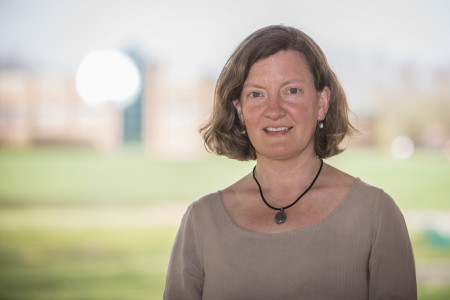For many people in the Midwest and on the East Coast, deindustrialization has become a deciding factor in whether or not their town or district continues to thrive. Christine Walley, a professor of anthropology at Massachusetts Institute of Technology (MIT), spoke about this phenomenon in her talk, “The Exit Zero Project: Exploring the Aftermath of Deindustrialization in Chicago,” which was held in JRC 101 on Tuesday, April 14. The Rosenfield Program in Public Affairs, International Relations and Human Rights co-sponsored Walley’s talk.
Deindustrialization is the process through which industrial jobs and infrastructure are taken out of a community or area, often without a replacement for the jobs lost. Walley has spent the greater part of the last 10 years studying deindustrialization in her place of origin, the southeast side of Chicago, whose economy was reliant on various steel mills up through 1980. When the mills began to go bankrupt in the years afterwards, they closed down and thousands lost their jobs and ways of life. Walley’s father was one of them, and her work has been a way of understanding and coming to terms with the loss.

Photo by Chris Lee.
“A lot of people had this need to document and witness stories that had happened and make sense of this incredible transformation in the area,” Walley explained, concerning her motivations for the project, which includes a book, documentary and interactive website. Walley characterizes this approach to the subject as “trans-media,” and each facet of her project explains the issue of deindustrialization in its own way. Walley’s husband, who is also a filmmaker, encouraged her to consider making a documentary about her father after they visited him in southeast Chicago.
However, the idea of deindustrialization is not confined to southeast Chicago, and Walley recognizes this and attempts to showcase the film in places where people will be able to relate.
“A fair number of the invitations we’ve received have been from people or schools who may have experienced something similar,” Walley said. “[For] example, we have gotten no invitations to California.”
For Walley, deindustrialization has and will always be a part of her life. Since the closing of the steel mills, her father has not been able to hold a steady job, as no industry came to replace them, which emphasized to her the importance of this research.
“In the nineties, I think a lot of people thought this was kind of a passé topic, because the economy was going strong and there was really that idea that things like steel mills were things of the past and we were moving on to a more information-based economy,” Walley said. “I think more recently, and particularly since the financial crisis of 2008 … there’s been much more interest in deindustrialization again.”
During her early 20s, Walley was diagnosed with cancer, possibly relating to contamination from the plants. For now, the area that used to house the steel mills is contaminated land. The land emits toxic byproducts and cannot permit further use.
Besides the environmental impact of deindustrialization, the effect on the community has been monumental, according to Walley. Southeastern Chicago has become an example of expanding inequality as the middle class in the region has almost disappeared due to the loss of jobs. Instead of supporting a middle class, a larger disparity has opened up and most people live in both extreme ends of the economic spectrum.
“We’re seeing long term impacts of deindustrialization in ways that we didn’t anticipate,” Walley said.
Audience member Sebastian Rivera ’18 said that he found Walley’s talk to be engaging and intriguing.
“I came here because it’s about my hometown and it provided me with a perspective on a social issue I’ve never thought about,” Rivera said.




























































